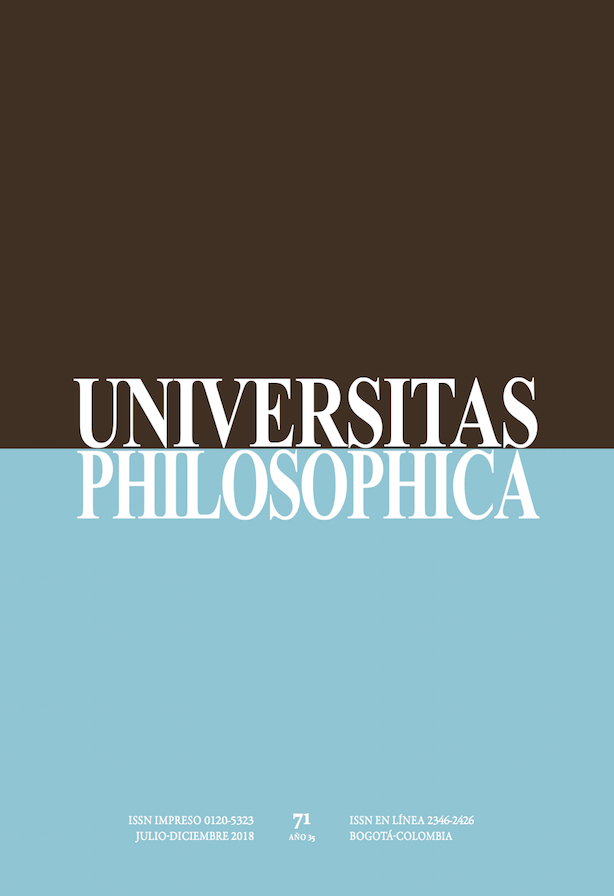Abstract
This paper is an outline of some ways that lead us to think about the necessity of memory, inherent to the experience of the present. We will work around three thematic lines within the field of philosophy of history: first, the relation between the past and our present; second, the problem of the personal disposition of the subject of historical knowledge and his inevitable belonging to the present at the level of action; and the sense of a possible historical experience where the individual and the collective intersect each other, in relation to the question of establishing whether it is appropriate to make an exhaustive remembrance of those who died because of the armed conflict in Colombia. With this purpose, we will point out to a series of elements drawn from Benjamin’s philosophy of memory so as to rehearse some possible connections with the philosophies of forgetfulness, remembrance and memory proposed by Nietzsche and Bergson. Thus, we seek to establish the reality of the past that is based on the virtual existence of recollection and, from there, to determine the ability of the latter to be updated in the form of vital forces, committed to making a future.
Benjamin, W. (1988a). Imaginación y sociedad. Iluminaciones I. Madrid: Taurus.
Benjamin, W. (1988b). Poesía y capitalismo. Iluminaciones II. Madrid: Taurus.
Bergson, H. (1959). Obras escogidas. México: Aguilar.
Deleuze, G. (1987). El bergsonismo. Madrid: Cátedra.
Grupo de Memoria Histórica (2013). ¡Basta ya! Colombia: memorias de guerra y dignidad. Bogotá: Imprenta Nacional.
Grupo de Memoria Histórica (2009). Memorias en tiempo de guerra. Repertorio de iniciativas. Bogotá: Comisión Nacional de Reparación y Reconciliación.
Horkheimer, M. (1983). La métaphysique bergsonienne du temps. L’Homme et la Société, (69-70), 9-29.
Horkheimer, M. (2014). Sur Les deux sources de la morale et de la religion de Henri Bergson. En: F. Arnaud. (Ed.). Annales bergsoniennes (Vol. VII) (pp. 95-98). Paris: PUF.
Jelin, E. (2002). Los trabajos de la memoria. Madrid: Siglo XXI de España Editores.
Lavelle (2008). Religion et histoire. Paris: Les Éditions du Cerf.
Löwy, M. (2005). Walter Benjamin: aviso de incendio. Una lectura de las tesis “Sobre el concepto de historia”. Buenos Aires: Fondo de Cultura Económica.
Macherey, P. (2013). Proust. Entre littérature et philosophie. Paris: Éditions Amsterdam.
Nietzsche, F. (2011). Obras completas (Vol. I). Madrid: Tecnos.
Nietzsche, F. (2014). Obras completas (Vol. II). Madrid: Tecnos.
Mate, R. (2009). Medianoche en la historia. Comentarios a las tesis de Walter Benjamin “Sobre el concepto de historia”. Madrid: Trotta.
Pardo, N. & Ruiz, J. (2017). Víctimas, memoria y justicia: aproximaciones latinoamericanas al caso colombiano. Bogotá: Universidad Nacional de Colombia.
Proust, M. (1993). En busca del tiempo perdido (Vol. 1). Por el camino de Swann. Madrid: Alianza Editorial.
Renouard, M. (2012). Virtuel et réminiscense. En: C. Riquier. (Dir.). Bergson (pp. 285-300). Paris: Les Éditions du Cerf.
Tiedemann-Bartels, H. (2007). “La mémoire est toujours de la guerre”. Benjamin et Péguy. En: H. Wismann. (Ed.). Walter Benjamin et Paris (pp. 133-143). Paris: Les Éditions du Cerf.
Virno, P. (2003). El recuerdo del presente. Ensayo sobre el tiempo histórico. Buenos Aires: Paidós.
Weigel, S. (1999). Cuerpo, imagen y espacio en Walter Benjamin. Una relectura. Buenos Aires: Paidós.
This journal is registered under a Creative Commons Attribution 4.0 International Public License. Thus, this work may be reproduced, distributed, and publicly shared in digital format, as long as the names of the authors and Pontificia Universidad Javeriana are acknowledged. Others are allowed to quote, adapt, transform, auto-archive, republish, and create based on this material, for any purpose (even commercial ones), provided the authorship is duly acknowledged, a link to the original work is provided, and it is specified if changes have been made. Pontificia Universidad Javeriana does not hold the rights of published works and the authors are solely responsible for the contents of their works; they keep the moral, intellectual, privacy, and publicity rights.
Approving the intervention of the work (review, copy-editing, translation, layout) and the following outreach, are granted through an use license and not through an assignment of rights. This means the journal and Pontificia Universidad Javeriana cannot be held responsible for any ethical malpractice by the authors. As a consequence of the protection granted by the use license, the journal is not required to publish recantations or modify information already published, unless the errata stems from the editorial management process. Publishing contents in this journal does not generate royalties for contributors.


